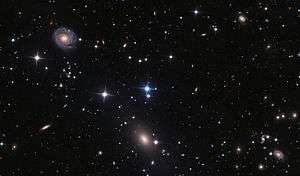NGC 6086
NGC 6086 is an elliptical galaxy in the constellation of Corona Borealis.[1] It has an apparent magnitude of 12.7.[2] A Type-cD galaxy, it is the brightest cluster galaxy in the cluster Abell 2162.[3] In 2010, a supermassive black hole was discovered in NGC 6086.[4]
| NGC 6086 | |
|---|---|
 NGC 6086 (below, center) and NGC 6085 | |
| Observation data (J2000 epoch) | |
| Constellation | Corona Borealis[1] |
| Right ascension | 16h 12m 35.4s[1] |
| Declination | 29° 29′ 02″[1] |
| Apparent magnitude (V) | 12.7[2] |
| Characteristics | |
| Type | E[1] |
References
- Rumistrzewicz, Stefan (2010). A Visual Astronomer's Photographic Guide to the Deep Sky: A Pocket Field Guide. New York, New York: Springer Science & Business Media. p. 158. ISBN 978-1-4419-7242-2.
- Aranda, Ted (2011). 3,000 Deep-Sky Objects: An Annotated Catalogue. The Patrick Moore Practical Astronomy Series. New York, New York: Springer Science & Business Media. p. 556. ISBN 978-1-4419-9419-6.
- McConnell, Nicholas J.; Ma, Chung-Pei; Graham, James R.; Gebhardt, Karl; Lauer, Tod R.; Wright, Shelley A.; Richstone, Douglas O. (2011). "The Black Hole Mass in the Brightest Cluster Galaxy NGC 6086". The Astrophysical Journal. 728 (2): 100. arXiv:1009.0750. Bibcode:2011ApJ...728..100M. doi:10.1088/0004-637X/728/2/100.
- McConnell, Nicholas J.; Ma, Chung-Pei; Graham, James R.; Gebhardt, Karl; Lauer, Tod R.; Wright, Shelley A.; Richstone, Douglas O. (2010). "The Black Hole Mass in Brightest Cluster Galaxy NGC 6086". The Astrophysical Journal. 728 (2): 100. arXiv:1009.0750. Bibcode:2011ApJ...728..100M. doi:10.1088/0004-637X/728/2/100.
This article is issued from Wikipedia. The text is licensed under Creative Commons - Attribution - Sharealike. Additional terms may apply for the media files.